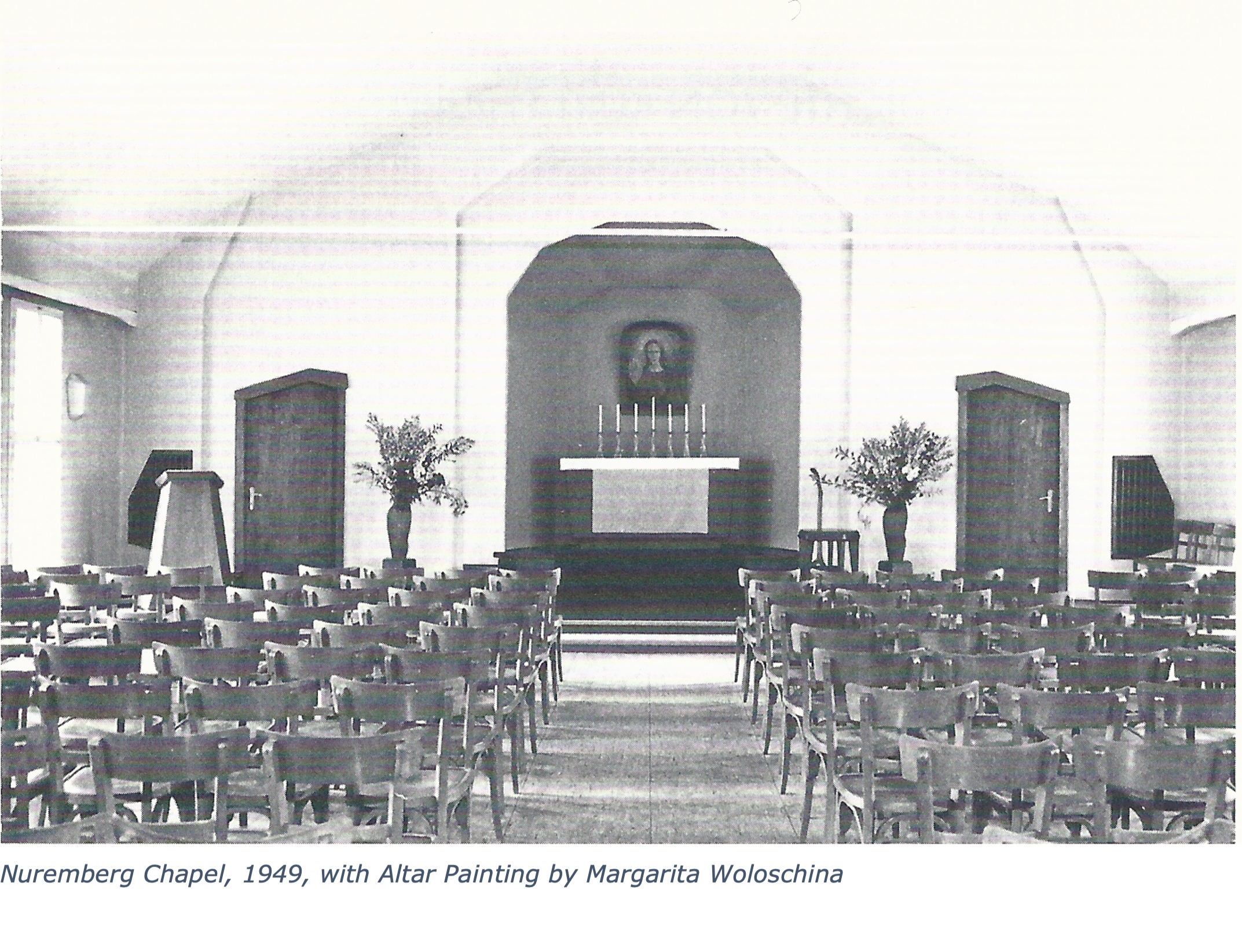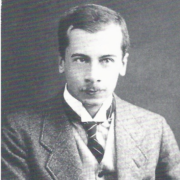Kurt Philippi
Die Gruender der Christengemeinschaft: Ein Schicksalsnetz
By Rudolf F. Gaedeke
Translated by Cindy Hindes
October 16, 1892, Munich – March 19, 1955, Nuremberg
Kurt Philippi was born in Munich on October 16, 1892. His father had a store for shoemaking supplies; his mother was a court actress, first in Darmstadt, then in Munich. In the year after his birth, the young family moved to Teplitz in Bohemia, where his father took over the management of a shoe factory. There, in Teplitz, his siblings Else and Paul were also born. Else died of diphtheria at the age of four.
Kurt Philippi’s early childhood ended in 1899. The family moved to Berlin, where his father became a salesman after losing almost his entire fortune as co-owner of the Teplitz factory.
The boy began his schooling there in Berlin. His last school was the Hohenzollern-Reformgymnasium Schöneberg, which he left in February 1912 with the certificate to study German and new languages. This decision was based on his talent for these subjects and his desire to become a librarian. However, after leaving school, various fateful encounters and experiences led him to study Protestant theology at the University of Berlin in April 1912.
In October 1913, his father died of a stroke. Through iron diligence, supported by Kurt’s mother, who managed the business correspondence, he had created a financial basis again and thus made Kurt’s studies possible.
In February 1915, Kurt Philippi was called up for military service in World War I. He first took part in the Russian campaign and then went to the Western Front in France. He experienced all the phases of positional warfare with their immense human losses in battle until the retreat.
At the beginning of October 1918, Kurt Philippi fell ill with severe influenza on the Western Front and had to be sent to the reserve military hospital in Aschaffenburg. The disease had not yet been overcome when he was released in November. This not fully healed illness continued to make his physical constitution appear fragile. It was certainly a major cause of his many years of suffering and his relatively early death.
He resumed his theological studies in Berlin in the winter semester of 1918/19 and passed his exams in the spring of 1922. However, great doubts of faith had arisen in Kurt Philippi, probably not least due to his war experiences. They made it seem impossible for him to enter a parish office of the regional church. The Protestant doctrine of the sacrament and the administration of the sacrament, in particular, made it impossible for him to cooperate. Therefore, during his last semesters of theology studies, he had already taken up training in the institute of Dr. E. Drach, lecturer for language education and the art of lecturing at the University of Berlin. He completed this one-and-a-half-year course of study with a diploma as a ‘teacher for voice training and performance art, especially for purposes of the German school’.
In his second period of study after the World War, Kurt Philippi became acquainted with Friedrich Rittelmeyer, Emil Bock and the circle that had formed around them and thereby with anthroposophy. Unfortunately, we do not know how these encounters took place. Kurt Philippi only related that he joined everything “with enthusiasm”.
His enthusiasm became even stronger in the preparation for religious renewal. Here it was a matter of a new understanding of the sacraments comprehensible to present-day consciousness and the intention to cultivate a completely renewed form of cultus.
Thus Kurt Philippi became a co-founder of The Christian Community. He reported how much he was touched by Michael Bauer’s visit to Breitbrunn during the preparatory meeting for Dornach. Bauer impressively spoke to the circle that the most important thing for a spiritual aspirant, i.e., a pastor, is “inner composure,” which is true “wood-chopping work,” and yet must proceed without any physical tension.
Emil Bock ordained Kurt Philippi on September 16, 1922, shortly before Kurt’s 30th birthday, as the eighteenth of the whole circle.
He went from Dornach to Magdeburg, where he had already prepared a church foundation. This city of Ottonian Christianity on the Elbe, directed by the Kaiser, did not immediately open up to the newcomer. It was a difficult time. Kurt Philippi soon went to Naumburg-an-der-Saale, where he replaced his Berlin friend Dr. Eberhard Kurras. His time in Naumburg also lasted only briefly – as did his following time in Leipzig. In February 1926, after three-and-a-third years of teaching in three different places, Kurt Philippi came to Nuremberg, the site of the imperial castle.
In Nuremberg, he accomplished his real life’s work; he worked there as a quiet, always active congregational pastor and companion of his fellow pastors Wilhelm Kelber, Karl Ludwig and later Eberhard Kurras. From his marriage in Nuremberg came two sons. He was there when The Christian Community was banned on June 9, 1941, and remained there with his family during the war. He was spared military service for health reasons until the final phase, when he finally had to enlist in the Volkssturm. From 1941 to 1943, he trained as a bookseller at the M. Edelmann company in Nuremberg.
During the four years of the ban, he was the only pastor present in Nuremberg and thus could maintain personal relationships with the parishioners in the hard-hit city. During the war, he accompanied in prayer his friends in the field, especially those who had fallen.
 Immediately after the end of the Second World War and the collapse of the Third Reich, he began the work in the community when his colleagues could not yet be back in Nuremberg. At Pentecost 1945, the first Consecration Service after the war was read with congregation members and celebrated soon after.
Immediately after the end of the Second World War and the collapse of the Third Reich, he began the work in the community when his colleagues could not yet be back in Nuremberg. At Pentecost 1945, the first Consecration Service after the war was read with congregation members and celebrated soon after.
He prepared confirmands for twenty years, and time and again, he brought a circle of players to impressive performances in the Oberufer Christmas plays.
Kurt Philippi also cultivated contacts with the authorities and thus made it possible to build a community center as early as 1948/49, just outside the old city wall under the Kaiserburg on a partial plot of the Schwanhäußergarten. His quiet manner inspired confidence, and the building was able to come about despite all the adverse circumstances. It was not until 1976 that it had to make way for a much larger church building.
Emil Bock consecrated this first building on December 18, 1949. One year later, Kurt Philippi experienced the same symptoms of illness as in 1918. Recuperation and sanatorium stays were necessary. But the disease (Parkinson’s) could not be stopped. Much patience had to be exercised. A large circle of friends accompanied his time of suffering.
He suffered in full consciousness until shortly before his death on March 19, 1955. He passed away in the sixty-third year of his life, like so many of the founding circle.
Kurt Philippi’s quiet, restrained nature was never forward. Everything that stood out, everything conspicuous, was alien to his nature. In silence, he expressed many things that moved him in the form of poems — without wanting to be a poet. He wrote many such poems, often on current events. His life would be incompletely represented if some of these poems were not considered. The poems “Den Kindern unserer Zeit [The Children of our Time]” he sent to Emil Bock shortly before his death; the second and third probably speak more of his own longing.
MEMORANDUM
Inspired by Mr. Klein’s remarks, the following has become clear to me on repeated reflection: If the goal of religious renewal set forth in the Dornach Commitments is to be realized in the foreseeable future, it is necessary that those who wish to work for this goal join together in a community during the Berlin University Week to prepare themselves for their public work as soon as possible in close cooperation under the direction of Dr. Steiner, above all to strengthen the power and purity of the religious impulse within themselves and to acquire pedagogical insights and skills. If possible, public lectures should begin this summer. As desirable as greater inner maturity and, ultimately, the attainment of academic degrees and certificates of competency would be for us, it seems to me at the present time to be incomparably more important that our seeds be sown while the wind is still reasonably calm. So I would urge Dr. Steiner to be helpful to us in our preparation for public activity. I am determined, after such preparation, to devote myself immediately to public activity in the interests of our cause if the Central Office deems the time suitable and me qualified to do so.
Kurt Philippi, Berlin-Friedenau, November 26, 1922


Leave a Reply
Want to join the discussion?Feel free to contribute!